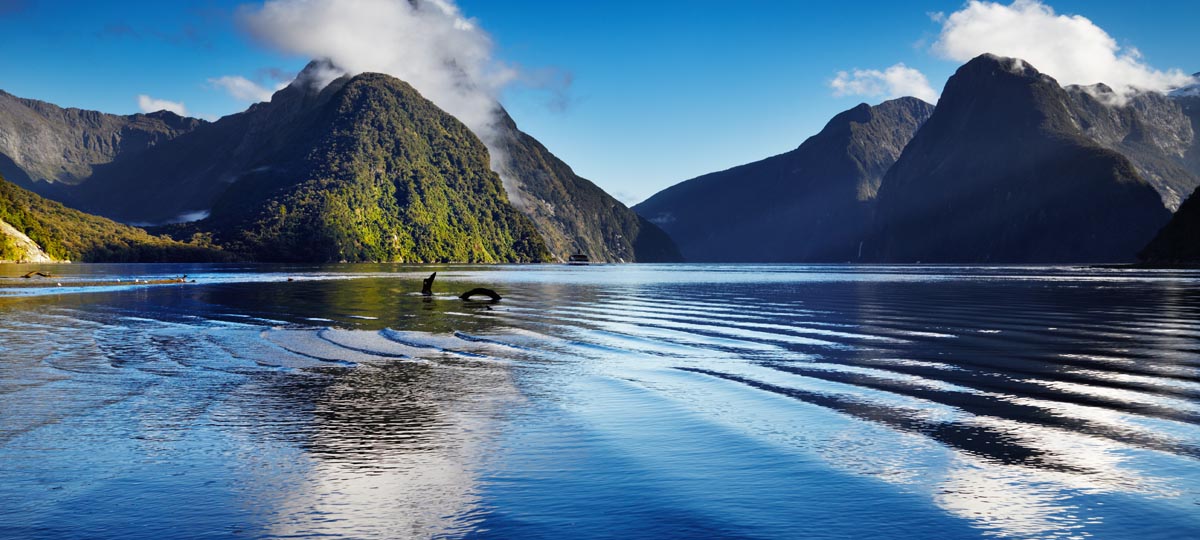NEW ZEALAND TRAVEL TIPS
Time Zone
New Zealand is one of the first places in the world to see the new day, 12 hours ahead of GMT (Greenwich Mean Time). In summer New Zealand uses daylight saving, with clocks put forward one hour to GMT + 13. Daylight saving begins on the last Sunday in September and ends on the first Sunday in April of the following year.
Language
In April 2006, New Zealand became the first country to declare sign language as an official language, alongside Maori and English.
Maori is only used in New Zealand and nowhere else in the world. Despite its official status, the language continues to struggle against being lost. Some useful Maori phrases include haere mai: welcome; kia ora: hello or "gidday"; haere ra: good bye; hongi: traditional greeting by pressing noses; hangi: oven comprising a hole in the ground in which food is cooked by heated stones; kai: food, eat.
Currency
New Zealand's currency is the New Zealand dollar (NZ$). The NZ dollar is divided into 100 cents. Coins: 10c, 20c, 50c, $1 and $2. Notes: $5, $10, $20, $50 and $100.
Money Matters
Cash can be withdrawn from ATMs 24 hours a day.
Use of EFTPOS (Electronic Funds Transfer at Point of Sale) is common.
All international credit cards (American Express, Diners, JCB, VISA, Mastercard) are accepted.
Travellers cheques may be changed at banks, hotels and large stores in the main cities and tourist areas.
Tipping
Tipping is completely optional in New Zealand, and staff do not depend on tips for income – the total at the bottom of a restaurant bill is all you need to pay (note that sometimes there’s an additional service charge). That said, it’s totally acceptable to reward good service and the tip you leave depends entirely on your satisfaction – between 5% and 10% of the bill is the norm.
Weather
Best time to go to New Zealand
New Zealand has mild temperatures, moderately high rainfall, and many hours of sunshine throughout most of the year. The north of New Zealand is subtropical and temperate. The warmest half the year is from September to April. The summer months of December, January and February are an ideal time for outdoor pursuits. Spring is from September to November. Autumn is from March to May and winter from June to August.
Maximum daytime temperatures vary from 15 to 32°C in summer, 10 to 25°C in autumn and spring, and 5 to 18°C in winter. However, winter is the ideal time to warm up close to an open fire in one of the many splendid lodges dotted around the country – or even to venture out to the numerous ski slopes found in New Zealand.
Clothing
Dress is informal and relaxed on most occasions. Smart casual clothes are acceptable at most restaurants and nightspots. Men are generally not expected to wear suits and ties, except in a few of the top formal bars and restaurants in major cities.
In summer a light jacket or sweater should be included in your luggage should the weather turn cooler or if you plan to visit the high country. You can expect some rain, so include a light waterproof jacket or coat. Pack warm winter clothing if visiting between May and September. Layer your clothing.
Health
New Zealand has no vaccination requirements for any traveller. While health care in NZ is of a high standard and not overly expensive by international standards, considerable costs can be incurred and repatriation can be extremely expensive.
For up to date information on latest health and vaccination recommendations, please contact your doctor.
Electricity
New Zealand uses 3 pin plugs, 230/240 volts, 50 Hz.
Photography
If you wish to take photographs of local indigenous people always ask permission first, as they may be camera shy.
Arrival and Departure Formalities
Citizens of Australia don’t need a visa to visit New Zealand and can stay indefinitely (provided they have no criminal convictions).
UK citizens don’t need a visa either and can stay in the country for up to six months.
Citizens of another 56 countries that have visa-waiver agreements with NZ don’t need a visa for stays of up to three months, provided they have an onward ticket, sufficient funds to support their stay (NZ$1000 per month, or NZ$400 per month if accommodation has been prepaid) and a passport valid for three months beyond the date of their planned departure from NZ. Nations in this group include Canada, France, Germany, Ireland, Japan, the Netherlands and the USA. Citizens of other countries must obtain a visa before entering NZ. Visas come with three months standard validity and cost NZ$100 if processed in Australia or certain South Pacific countries (eg Samoa, Fiji), or NZ$130 if processed elsewhere in the world.
Disembarkation in NZ is generally a straightforward affair, with only the usual customs declarations to endure. One procedure has the Orwellian title Advance Passenger Screening, a system whereby documents that used to be checked after you touched down in NZ (passport, visa, etc) are now checked before you board your flight – make sure all your documentation is in order so your check-in is stress-free.
Your ticket out of New Zealand will usually not include NZ departure tax (except flying out of Auckland). If you are flying out of Auckland the departure tax is included in your ticket and no extra money will be paid at the airport. Auckland changed to this system on the 1st July 2008.
If you are flying from other centres you may still be charged, with children under 12 free. The other centres are working towards including the departure tax in the tickets to become more inline with Auckland and other international airports. For centres other than Auckland: New Zealand departure tax is NZ$25 and payable by cash or credit card at the BNZ (Bank of New Zealand) office at the airport after you check in. Children under 12 years of age (except Wellington which charges NZ$10 for children) and transit passengers in New Zealand for less than 24 hours are exempt.
Local Food
New Zealand has a reputation as a leading producer of meat and dairy produce with lamb, beef and pork on most menus. Venison is also widely available. Locally produced vegetables, such as kumara (a natural sweet potato), are good. There is also a wide range of fish available, including snapper, grouper and John Dory. Seasonal delicacies such as whitebait, oysters, crayfish, scallops and game birds are recommended. New Zealand is also establishing a reputation for French-type cheeses: bleu de Bresse, brie, camembert and montagne bleu.
National specialties:
Kumara (native sweet potato) in Auckland.
Feijoa (local fruit) and golden-fleshed Zespri Gold kiwi fruit from the Bay of Plenty.
Battered fish and chips from Gisbourne.
Pavlova (a large roundcake with a meringue base topped with cream and fruit) from Taranaki.
Salmon and mussels from Marlborough.
Yams, seaweed and crayfish from Canterbury.
Whitebait from the West Coast.
Koura (freshwater crayfish) from Central Otago.
Bluff oysters and muttonbird from Southland.
Local Handicrafts
There are many interesting items to choose from in New Zealand, including local wines, woollen, leather/sheepskin goods, modern art, sculptures and paintings and tribal objects, such as traditional bone carvings and greenstone (jade) carvings, beautiful timber crafts (kauri and other native timber), gorgeous glass and ceramics, paua shell jewellery.
All goods and services are subject to a 12.5% Goods and Services Tax (GST) included in the displayed price. Visitors cannot claim this tax back; however when a supplier ships a major purchase to a visitor’s home address the GST will not be charged.




